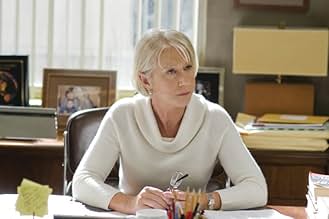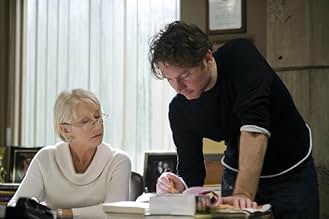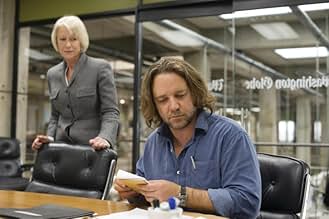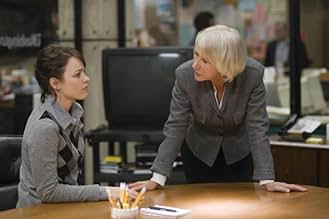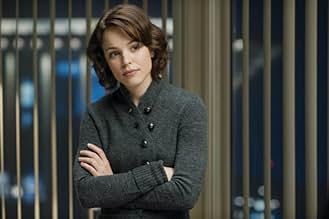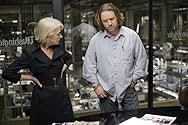Als der Assistent eines Kongressabgeordneten getötet wird, beginnt ein Journalist aus Washington DC den Fall zu untersuchen, an dem auch der Kongressabgeordnete, ein alter College-Freund, be... Alles lesenAls der Assistent eines Kongressabgeordneten getötet wird, beginnt ein Journalist aus Washington DC den Fall zu untersuchen, an dem auch der Kongressabgeordnete, ein alter College-Freund, beteiligt war.Als der Assistent eines Kongressabgeordneten getötet wird, beginnt ein Journalist aus Washington DC den Fall zu untersuchen, an dem auch der Kongressabgeordnete, ein alter College-Freund, beteiligt war.
- Auszeichnungen
- 2 Gewinne & 4 Nominierungen insgesamt
Robin Wright
- Anne Collins
- (as Robin Wright Penn)
Steve Park
- Chris Kawai
- (as Stephen Park)
Empfohlene Bewertungen
About a month before State of Play came into theaters, I read an article in The Washington Post (I live in the D.C. area) about the realism of the news industry as portrayed in the movie. One of the Post reporters served as a consultant on the set and I must say that he seems to have done his job. Almost every aspect, from the constantly chaotic state of the newsroom to the reporter-lingo, feels authentic and true to reality. While there are occasional times when the movie's main character, the reporter Cal McCaffrey, strays from the usual ethical and professional guidelines, there are logical explanations for such instances that are given in the movie. At one point, Russell Crowe even ad-libs a line about the outdated technology he has compared to the state-of-the-art computers given to Della Fry, Rachel McAdams's gossipy blogger: "I've been here fifteen years, I've got a sixteen year old computer. She's been here fifteen minutes and she's got enough gear to launch a f***ing satellite." This line was inspired by the feud between print journalists and their online counterparts that, according to the Post reporter, exists in real-life. Because journalism is so crucial to the story of State of Play, every minute detail contributes greatly to the believability of the film as a whole and it is this attention to detail that really elevates State of Play above the average political thriller.
The cast, which includes three Oscar winners, though Ben Affleck won for screen writing, could not be more perfect. With his long, shaggy hair, bulging belly and old, trash-littered car, Russell Crowe looks appropriately scruffy and he disappears into his role, becoming one of the most convincing journalists on screen in recent years. It is impossible to imagine anyone else in the role, especially Brad Pitt, who was originally signed on for the part. As his partner on the story, Rachel McAdams delivers, giving her character a very energetic yet idealistic flavor. Della Fry is, at least in the beginning, a rather obnoxious woman but, in large part due to McAdams, she gradually becomes more likable and we learn to accept her for who she is. Helen Mirren is splendid as Cameron, McCaffery and Fry's insistent boss, and every time she appears, the screen comes alive (not that it's dead when she isn't there). Ben Affleck once again proves that he can act when given the right material. He gives his character, a promising congressman, an air of detached arrogance mixed with frustrated vulnerability. Representative Stephen Collins certainly has his principles but throughout the film, that sense of morality is largely shrouded in secrets and mystery and the audience is forced to constantly guess and re-guess his true intentions. Aside from the main actors, the supporting cast does a terrific job with a slightly comedic, almost delightfully over-the-top performance by Jason Bateman as a pretentious PR agent. Also worth noting is Viola Davis, who plays a contact of McCaffrey's in the morgue, and even though she only appears in one scene, she makes the most of that short screen-time that, in turn, makes us remember her well.
Other than the superb cast, one of the most impressive things about State of Play is the script, which was written by Tony Gilroy, Billy Ray and Matthew Michael Carnahan and based on the 2003 BBC mini-series of the same name. However, it bears Tony Gilroy's distinctive mark not only because it involves corporate conspiracies and unending twists, but the witty dialogue could have been written by almost no one else. Occasional instances of humor help lighten the otherwise rather dark mood. Also, the writing is highly intelligent and makes the audience actually think rather than simply go along with the complicated plot. This can also be contributed to the direction of Kevin MacDonald who, after winning an Oscar for his documentary One Day in September in 1999 and directing the Oscar-winning feature film The Last King of Scotland, proves that he has loads of talent and hopefully, will remain prominent in the film-making industry.
Other noteworthy aspects of the movie are the cinematography and the score, both of which help carry the tension throughout the entire two-and-a-half hour film, even during quieter scenes. However, State of Play is not quite perfect. The main, and perhaps only, flaw is the minor plot holes that, while virtually unnoticeable during the actual viewing of the movie, become more obvious upon dissecting the movie afterwards. It is impossible to discuss these errors in detail without giving anything away, but they do make the conclusion a little less satisfying.
Nonetheless, the movie is so good in all other areas that it is still easy to overlook the implausibility of the ending. From the virtually flawless cast and writing to the authenticity of its portrayal of journalists and the thought-provoking political themes, State of Play stands out among all the conventional political thrillers churned out by Hollywood in recent years. Go see it!
The cast, which includes three Oscar winners, though Ben Affleck won for screen writing, could not be more perfect. With his long, shaggy hair, bulging belly and old, trash-littered car, Russell Crowe looks appropriately scruffy and he disappears into his role, becoming one of the most convincing journalists on screen in recent years. It is impossible to imagine anyone else in the role, especially Brad Pitt, who was originally signed on for the part. As his partner on the story, Rachel McAdams delivers, giving her character a very energetic yet idealistic flavor. Della Fry is, at least in the beginning, a rather obnoxious woman but, in large part due to McAdams, she gradually becomes more likable and we learn to accept her for who she is. Helen Mirren is splendid as Cameron, McCaffery and Fry's insistent boss, and every time she appears, the screen comes alive (not that it's dead when she isn't there). Ben Affleck once again proves that he can act when given the right material. He gives his character, a promising congressman, an air of detached arrogance mixed with frustrated vulnerability. Representative Stephen Collins certainly has his principles but throughout the film, that sense of morality is largely shrouded in secrets and mystery and the audience is forced to constantly guess and re-guess his true intentions. Aside from the main actors, the supporting cast does a terrific job with a slightly comedic, almost delightfully over-the-top performance by Jason Bateman as a pretentious PR agent. Also worth noting is Viola Davis, who plays a contact of McCaffrey's in the morgue, and even though she only appears in one scene, she makes the most of that short screen-time that, in turn, makes us remember her well.
Other than the superb cast, one of the most impressive things about State of Play is the script, which was written by Tony Gilroy, Billy Ray and Matthew Michael Carnahan and based on the 2003 BBC mini-series of the same name. However, it bears Tony Gilroy's distinctive mark not only because it involves corporate conspiracies and unending twists, but the witty dialogue could have been written by almost no one else. Occasional instances of humor help lighten the otherwise rather dark mood. Also, the writing is highly intelligent and makes the audience actually think rather than simply go along with the complicated plot. This can also be contributed to the direction of Kevin MacDonald who, after winning an Oscar for his documentary One Day in September in 1999 and directing the Oscar-winning feature film The Last King of Scotland, proves that he has loads of talent and hopefully, will remain prominent in the film-making industry.
Other noteworthy aspects of the movie are the cinematography and the score, both of which help carry the tension throughout the entire two-and-a-half hour film, even during quieter scenes. However, State of Play is not quite perfect. The main, and perhaps only, flaw is the minor plot holes that, while virtually unnoticeable during the actual viewing of the movie, become more obvious upon dissecting the movie afterwards. It is impossible to discuss these errors in detail without giving anything away, but they do make the conclusion a little less satisfying.
Nonetheless, the movie is so good in all other areas that it is still easy to overlook the implausibility of the ending. From the virtually flawless cast and writing to the authenticity of its portrayal of journalists and the thought-provoking political themes, State of Play stands out among all the conventional political thrillers churned out by Hollywood in recent years. Go see it!
In 'State of Play' the surprises keep coming. A politician's staff-member has been murdered and two journalists set out to discover the 'Who' (who killed her) and the 'Why'. We go down one alley, then another, all our beliefs challenged, then changed, but throughout it all our interest remains pretty high.
But then ... then something happens. One of the characters says something that she could not possibly know about, and this re-arranges all the assumptions we have made about guilty parties. Which is fine. But for one thing. The character who made the telling statement all but disappears from the film. She is not guilty. And the someone who is guilty is not the person who made the statement. And so the question is, what really happened here? I don't know. And I should know, because that's what the film was leading up to. Who Done It? Easy. Yes?
Russel Crowe is fine as one journalist, Rachel McAdam is superb as his younger associate. Ben Affleck is his usual stoic self, though it works in this role. Helen Mirren is shrill - too shrill - in her role as the newspaper's managing editor. For fans of Robin Wright - and there are many - she's fine as the wife of the Affleck character; thrown over for someone younger.
Finally, the film is - how to say? - flabby. It's not as tight as it should be. It goes off on tangents that lead nowhere at times when we should be tightening up the script and the tension. Also, it's kind of 'old fashioned'; the sort of plucky-young-journalist film they don't make anymore.
Anyway, it made for an entertaining evening. And that's more than merely O.k.
But then ... then something happens. One of the characters says something that she could not possibly know about, and this re-arranges all the assumptions we have made about guilty parties. Which is fine. But for one thing. The character who made the telling statement all but disappears from the film. She is not guilty. And the someone who is guilty is not the person who made the statement. And so the question is, what really happened here? I don't know. And I should know, because that's what the film was leading up to. Who Done It? Easy. Yes?
Russel Crowe is fine as one journalist, Rachel McAdam is superb as his younger associate. Ben Affleck is his usual stoic self, though it works in this role. Helen Mirren is shrill - too shrill - in her role as the newspaper's managing editor. For fans of Robin Wright - and there are many - she's fine as the wife of the Affleck character; thrown over for someone younger.
Finally, the film is - how to say? - flabby. It's not as tight as it should be. It goes off on tangents that lead nowhere at times when we should be tightening up the script and the tension. Also, it's kind of 'old fashioned'; the sort of plucky-young-journalist film they don't make anymore.
Anyway, it made for an entertaining evening. And that's more than merely O.k.
Good thriller with some excellent performances. Russell Crowe is suitably grizzled as the been around reporter and Helen Mirren is wonderfully tough as his editor, the problem is the casting of Ben Affleck. He gives a good enough performance but is far too young to be believable as Crowe's college roommate or Robin Wright Penn's husband, not his fault but a major casting error nonetheless. Originally Crowe and Affleck's parts were to be filled by Brad Pitt and Edward Norton a far more simpatico pairing the obvious disparity in the leads ages distracts throughout the film. Jason Bateman shows up late in the movie to offer up a fun, out there performance as a sleaze. The story itself does move along and offers some nice tension and twists.
Whether you loved em' or hated em', espionage thrillers made up a generous portion of cinema from the 1940-50's. With fast paced, edge of your seat story lines, plot twists, political undertones and dramatic personal struggles with morality, nobody did it better than Emeric Pressburger and Michael Powell. Their attention to character detail and it's purpose in conjunction with the narrative gave heart and humanity to this new string of movies which could have fallen into similar (yet shallower) alpha male characters such as James Bond. Never the less, we cannot forget that ultimately if it weren't for their vision and invention of the genre, Hollywood may have never capitalized on the staggeringly profitable Bond franchise that's still going strong today.
In the mid 70's, due to the heat of the political environment at that time, the genre decided to go in the same direction. All The Presidents Men, brought to light the investigative strategies of Bob Woodward and Carl Bernstein and tackled the Watergate scandal from the perspective of the Washington Post. As audiences, we shared in the thrill of being able to follow the case as it unfolded, interviewing witnesses and piecing together clues in order to make a 10 O'clock print deadline. We were part of the chase, the scandal and always privy to the evidence necessary to solve the mystery at hand...that is until a new piece of evidence arose and bashed in all of our original assumptions.
State of Play may be the first film to pay homage to this Pakula classic while dually creating more poignant themes for today's political atmosphere. Crowe plays a reporter for the Washington Post and McAdams, an internet blogger, serving as our Woodward and Bernstein clones on the case of a Senator, Affleck, whose mistress succumbs to a rather untimely death VIA train tracks. To add insult to injury, it turns out that our reporter and senator are practically best friends. The plot unfolds, relationships falter and the real truth, to our pleasant surprise, blindsides us like a drunk driver on a narrow road.
Director Kevin Macdonald clearly knows what he's doing here and along with a well written screenplay by Tony Gilroy, carefully crafts a neat, sharp and extremely entertaining thrill ride of a movie whose run time is 2 hours and 15 minutes, but feels like 30. State of Play never fails at keeping you guessing, does a fine job of throwing in a few curve balls, and leaves you with a clean taste in your mouth come end credits. What more do you want? Sure. It isn't the next Best Picture and Crowe won't take home an Oscar, but you'll enjoy some nail biting action scenes and there are much worse things to look at than Rachel McAdams on the big screen for a few hours.
Helen Mirren is delightful in what little screen time she is given. Affleck is "good", although decided to play it completely safe in a role that even he really can't screw up. Lets face it, he needed to gain even a small amount of points since Hollywoodland and the flops that followed in his footsteps.
Overall, you'll be as pleased and refreshed as I was to see a picture that has the finesse of an espionage thriller, the entertainment value of an All The Presidents Men political drama and the edginess that we should expect from a modern day piece of cinema that doesn't star Miley Cyrus.
In the mid 70's, due to the heat of the political environment at that time, the genre decided to go in the same direction. All The Presidents Men, brought to light the investigative strategies of Bob Woodward and Carl Bernstein and tackled the Watergate scandal from the perspective of the Washington Post. As audiences, we shared in the thrill of being able to follow the case as it unfolded, interviewing witnesses and piecing together clues in order to make a 10 O'clock print deadline. We were part of the chase, the scandal and always privy to the evidence necessary to solve the mystery at hand...that is until a new piece of evidence arose and bashed in all of our original assumptions.
State of Play may be the first film to pay homage to this Pakula classic while dually creating more poignant themes for today's political atmosphere. Crowe plays a reporter for the Washington Post and McAdams, an internet blogger, serving as our Woodward and Bernstein clones on the case of a Senator, Affleck, whose mistress succumbs to a rather untimely death VIA train tracks. To add insult to injury, it turns out that our reporter and senator are practically best friends. The plot unfolds, relationships falter and the real truth, to our pleasant surprise, blindsides us like a drunk driver on a narrow road.
Director Kevin Macdonald clearly knows what he's doing here and along with a well written screenplay by Tony Gilroy, carefully crafts a neat, sharp and extremely entertaining thrill ride of a movie whose run time is 2 hours and 15 minutes, but feels like 30. State of Play never fails at keeping you guessing, does a fine job of throwing in a few curve balls, and leaves you with a clean taste in your mouth come end credits. What more do you want? Sure. It isn't the next Best Picture and Crowe won't take home an Oscar, but you'll enjoy some nail biting action scenes and there are much worse things to look at than Rachel McAdams on the big screen for a few hours.
Helen Mirren is delightful in what little screen time she is given. Affleck is "good", although decided to play it completely safe in a role that even he really can't screw up. Lets face it, he needed to gain even a small amount of points since Hollywoodland and the flops that followed in his footsteps.
Overall, you'll be as pleased and refreshed as I was to see a picture that has the finesse of an espionage thriller, the entertainment value of an All The Presidents Men political drama and the edginess that we should expect from a modern day piece of cinema that doesn't star Miley Cyrus.
I would label this a "decent-but-unmemorable political thriller," something you'd probably enjoy viewing but a few weeks later had forgotten much of it. Usually, movies which star Russell Crowe are more dynamic, although Crowe still mesmerizes as usual.
I liked the twists and turns at the end, but one has to wait about two hours for those and that's a little too long a wait. As slick a production as it was, and with acceptable acting from actor, it was many of the characters here that seemed more like Hollywood stereotypes than real-life people.
There was Crowe with the hippie looks from 30-40 years ago and who has the daring of James Bond; the Washington newspaper editor being a foul-mouthed Brit (crusty Helen Mirren) who uses profane expresses the Americans wouldn't know; the neophyte blogster (Rachel McAdams) being drop-dead gorgeous and getting her way despite tough bosses; the bad guys being anyone connected with the military (man, is that getting old, from Dr. Strangelove to today's films - it never changes), the professional sniper/assassin conveniently missing the good guy (Crowe) although he could kill anyone else......you get the picture - a few too many liberal film clichés. The most realistic character was probably "Rep. Stephen Collins (D-Pa)," played by the least of the actors, Ben Affleck.
As for minor characters, I thought "Dominic Foy," played by Jason Bateman, was fascinating, as was Robin Wright.
Overall, for entertainment purposes it was okay; not something you'd yawn and fall asleep watching, although you might be confused here and there. Through the gimmicks of hyped-up music and sound effects here and there, the suspense was evident throughout the two-plus hours. It's also an interesting look at today's battle between old and new "media," meaning newspapers and the Internet, respectively.
Overall, it's enough to warrant as a purchase at the rental store but not as a blind buy despite the "name" cast.
I liked the twists and turns at the end, but one has to wait about two hours for those and that's a little too long a wait. As slick a production as it was, and with acceptable acting from actor, it was many of the characters here that seemed more like Hollywood stereotypes than real-life people.
There was Crowe with the hippie looks from 30-40 years ago and who has the daring of James Bond; the Washington newspaper editor being a foul-mouthed Brit (crusty Helen Mirren) who uses profane expresses the Americans wouldn't know; the neophyte blogster (Rachel McAdams) being drop-dead gorgeous and getting her way despite tough bosses; the bad guys being anyone connected with the military (man, is that getting old, from Dr. Strangelove to today's films - it never changes), the professional sniper/assassin conveniently missing the good guy (Crowe) although he could kill anyone else......you get the picture - a few too many liberal film clichés. The most realistic character was probably "Rep. Stephen Collins (D-Pa)," played by the least of the actors, Ben Affleck.
As for minor characters, I thought "Dominic Foy," played by Jason Bateman, was fascinating, as was Robin Wright.
Overall, for entertainment purposes it was okay; not something you'd yawn and fall asleep watching, although you might be confused here and there. Through the gimmicks of hyped-up music and sound effects here and there, the suspense was evident throughout the two-plus hours. It's also an interesting look at today's battle between old and new "media," meaning newspapers and the Internet, respectively.
Overall, it's enough to warrant as a purchase at the rental store but not as a blind buy despite the "name" cast.
Wusstest du schon
- WissenswertesThe scene in which Cal (Russell Crowe) orders lunch, but is then interrupted by his bag getting stolen, was shot at Ben's Chili Bowl, a real Washington, D.C. lunch counter that has been open on U Street NW since 1958.
- PatzerIn the final scene of the printing montage at the end, the sign on the side of the truck says "Washington Post".
- Zitate
Cameron Lynne: I want you to do a complete rundown on this Sonia Baker: who she knew, who she blew, the color of her knickers.
- Crazy CreditsThe printing process of a newspaper is shown as the ending credits start to show up.
- VerbindungenFeatured in Charlie Brooker's Screenwipe: Folge #5.3 (2008)
- SoundtracksThe Night Pat Murphy Died
(Traditional)
Arranged by Alan Doyle, Bob Hallett (as Robert Hallett), Séan McCann, Darrell Power
Performed by Great Big Sea
Courtesy of Sonic Entertainment Group and Warner Music Canada Co.
Top-Auswahl
Melde dich zum Bewerten an und greife auf die Watchlist für personalisierte Empfehlungen zu.
Details
- Erscheinungsdatum
- Herkunftsländer
- Offizieller Standort
- Sprachen
- Auch bekannt als
- Los secretos del poder
- Drehorte
- Produktionsfirmen
- Weitere beteiligte Unternehmen bei IMDbPro anzeigen
Box Office
- Budget
- 60.000.000 $ (geschätzt)
- Bruttoertrag in den USA und Kanada
- 37.017.955 $
- Eröffnungswochenende in den USA und in Kanada
- 14.071.280 $
- 19. Apr. 2009
- Weltweiter Bruttoertrag
- 87.812.371 $
- Laufzeit2 Stunden 7 Minuten
- Farbe
- Sound-Mix
- Seitenverhältnis
- 2.35 : 1
Zu dieser Seite beitragen
Bearbeitung vorschlagen oder fehlenden Inhalt hinzufügen







